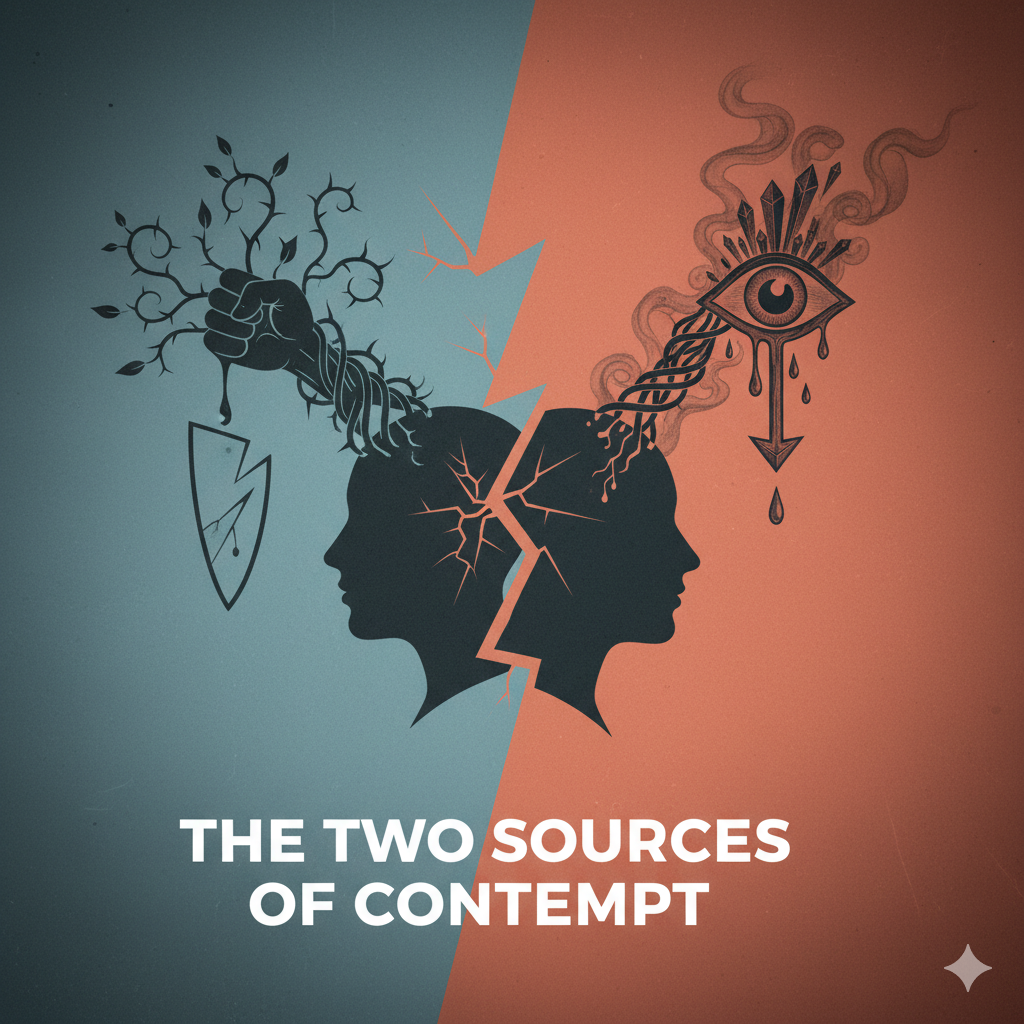We’re trained to recognize hatred when it punches up. The bitter, resentful attacks from people who feel left behind, overlooked, or diminished. This hatred is loud, obvious, and comes from below—from those who see others succeeding where they’ve failed.
But there’s another kind of contempt that’s harder to name, partly because we don’t expect it and partly because it disguises itself as standards, merit, or simply telling the truth.This is the contempt that comes from above.
Success breeds its own blindness
When you’ve done genuinely good work—built something meaningful, mastered a difficult skill, made sacrifices that paid off—you develop a framework for understanding how the world works. You know what it took to get where you are: the discipline, the hours, the decisions to delay gratification while others partied or coasted.
This knowledge becomes a lens. And like any lens, it distorts as much as it clarifies.You start to see people who made different choices not as people who faced different constraints or valued different things, but as people who simply chose wrong. The artist who never “made it” lacked discipline. The person in a dead-end job didn’t work hard enough. The community struggling economically made bad decisions. Your success proves your path was correct; their failure proves theirs was not.This is where contempt grows.
Competence creates distance
There’s a particular disdain that competent people develop for those who can’t or won’t do what they do. The engineer who’s fluent in systems thinking looks at someone struggling with basic technology and sees willful ignorance rather than a different aptitude distribution. The financially literate person sees someone living paycheck to paycheck and assumes irresponsibility rather than different circumstances or stressors.The contempt feels justified because it’s rooted in something real: you genuinely did do the hard work, make the sacrifices, develop the skills. The gap in capability or outcome is actual, not imagined.But the error is in assuming that gap represents a moral difference rather than a contextual one.
Different becomes inferior
Here’s the mechanism: when your path has been validated by results, other paths start to look not just different but defective. People who prioritized family over career ambition aren’t making a legitimate tradeoff—they’re being lazy. People who chose creative work over lucrative work aren’t following their values—they’re being impractical. People who stayed in their hometown instead of moving to a hub city aren’t making a valid choice—they’re lacking ambition.You begin to mistake your particular optimization for universal wisdom.This contempt is especially insidious among people who genuinely have contributed something valuable to the world. The successful entrepreneur who built a company from nothing may look at struggling workers with a specific kind of disdain—one that comes from the certainty that they themselves overcame similar odds through sheer will and intelligence. The professor who earned their position through decades of scholarship may view less educated people with barely concealed impatience.
The meritocracy trap
This kind of contempt flourishes in environments that tell you your success was earned entirely through merit. If you believe your position is purely the result of your superior choices and abilities, then other people’s different positions must reflect their inferior choices and abilities.This is comfortable. It means the world is just. It means you deserve everything you have. It means other people deserve everything they lack.It also means you can look down at entire categories of people—the less educated, the less wealthy, the less credentialed, those in different industries or geographies or life stages—and feel not just different from them but better than them.**Why this matters more than you think**Contempt from below is easy to dismiss. We recognize it as the sour grapes of resentment. But contempt from above shapes policy, institutions, and culture. It determines who gets heard, whose problems are taken seriously, which communities receive resources and which are written off as undeserving.
When successful people look at those who are different and see only deficiency, they design systems that reinforce their own worldview. They build meritocracies that reward the specific traits they possess. They create barriers that filter for people like themselves and call it excellence.**The uncomfortable truth**If you’ve done genuinely good work and achieved something meaningful, you’ve probably felt this contempt, even if you’ve never named it. That flash of irritation at people who “don’t get it.” That impatience with those who can’t seem to figure out what’s obvious to you. That quiet certainty that your way of moving through the world is not just one valid approach among many, but the right approach that others are failing to adopt.It doesn’t make you a bad person. But it does make you human—and humans with power and competence need to be especially careful about this particular failure mode.The work is to recognize that your success doesn’t grant you universal insight into everyone else’s life. That different doesn’t mean deficient. That the path that worked for you might not be available, appropriate, or desirable for someone else.
Your good work earned you achievement. It didn’t earn you the right to look down.

